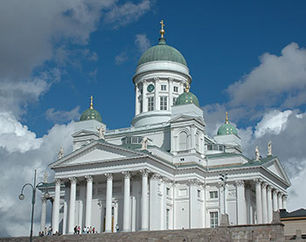Funding the cooperation
The Federal Ministry of Education and Research (BMBF) supports the cooperation of German institutions with Finish partners through a variety of funding announcements.
Please get in touch, if you have questions about the support services provided by the International Bureau.
Political framework
The current government programme follows the vision 'to make Finland a strong and committed country that can withstand global storms.' In terms of research and innovation, this means investing heavily in research, development and innovation.
In Finland, the Ministry of Education and Culture is responsible for the development of education, science, culture, sport and youth policy as well as for international cooperation in these areas.
On 1 January 2018, the Finnish funding agencies 'Tekes' and 'Finpro' were merged to form 'Business Finland' (BF) with the aim of bringing all public services for innovation and SME funding under one umbrella.
Finland has been one of the world's leading countries in the areas of innovation, research and development, technology and competitiveness for many years. This is also confirmed by the 'Global Competitiveness Report 2023'. Although there has been a negative trend since 2013, Finland is still in the 'Top 12' in eleventh place as the 6th European country behind Denmark (1), Ireland (2), Switzerland (3), the Netherlands (5) and Sweden (8). By comparison, Germany is ranked 22nd.
According to the 'Innovation Union Scoreboard 2023', Finland was able to maintain its position among the innovation leaders in Europe and is in third place behind Denmark and Sweden (ahead of the Netherlands and Belgium in 4th and 5th place).
In the European Commission's 'Digital Economy and Society Index 2022' (DESI), Finland occupies the top position ahead of Denmark and the Netherlands.
Finland's gross domestic expenditure on research and development (GERD in % of GDP) has been permanently below 3% of GDP since 2015, but has been rising steadily again since 2017 (2.95% in 2022). By comparison, the EU27 average is 2.23% (estimated). (all figures according to EUROSTAT, 2023).
Cooperation priorities
Cooperation between Germany and Finland takes place primarily within a multilateral framework and is geared towards actively shaping the European Research Area.
In the context of the EU Framework Programme for Research and Innovation (Horizon Europe), German and Finnish researchers are increasingly working together within the programme sections 'Digital, Industry and Space', 'Food, Bioeconomy Natural Resources, Agriculture and Environment' and 'Climate, Energy and Mobility'.
The focus of the research projects with Finnish participation within the BMBF's specialist programmes is in the field of information and communication technology.
European infrstructure
Finland is a member of several international research infrastructures, either through state treaties or other agreements. Membership of the research infrastructures is mainly carried out by the Ministry of Education and Culture.








